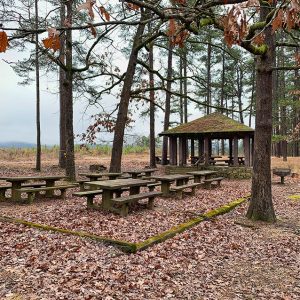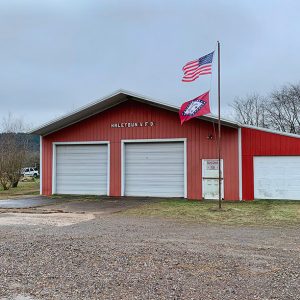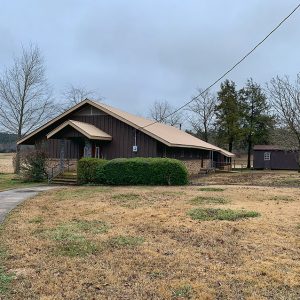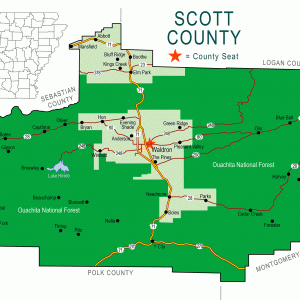calsfoundation@cals.org
Olio (Scott County)
Olio is an unincorporated community in eastern Scott County located along Highway 80. Olio was established in 1858 along Dutch Creek. Agriculture and timber have contributed to the economy and way of life in the region.
Prior to European exploration, the area surrounding Olio was a wilderness. Several species of wildlife that no longer inhabit the area, such as elk and buffalo, were present throughout the region. Numerous archaeological sites and burial mounds are located along the banks of prominent waterways such as Dutch Creek. Archaeological findings have provided evidence of early inhabitants dating to the Archaic, Woodland, and Mississippian periods. Further archaeological evidence has indicated that the people of the Caddo tribe later inhabited the area.
During the late seventeenth and early eighteenth centuries, French hunters and tradesmen traveled west from the Arkansas Post, exploring portions of western Arkansas. These Frenchmen often traversed rivers and streams throughout the region. Several rivers that flow through Scott County were likely named by these French explorers, including the Petit Jean, Poteau, and Fourche La Fave. It is probable that the explorers traveled along the Petit Jean River or Dutch Creek near present-day Olio.
Settlers began arriving in the area now known as Olio during the late 1830s and early 1840s. The area was settled throughout the early twentieth century. The origin of the name Olio is unknown. It is likely a colloquial name given to the area, as there was no family living in Scott County at the time with the name Olio.
The Olio Post Office was established in 1858 with Luther F. Pollard as the first postmaster. Union Hill Cemetery was established east of Olio and is located in the current community of Union Hill; however, it serves Olio and other surrounding communities. The oldest grave marker dates to 1860, though the cemetery was likely established earlier.
Men called to fight in the Civil War served with both the Confederacy and Union. The women, children, and elderly were left to look after family homes and farms. Bushwhacking occurred throughout the area during the war.
The Olio community was also known as Lick Skillet. Its name reportedly comes from a local resident who once said that “they were so poor they would have to lick their skillets to get something to eat.”
In May 1882, the Scott County Courthouse burned, destroying all records that defined the boundaries of the various school districts that had been established throughout the county. In August, the county court reestablished the boundaries of the fifty-six school districts active in the county, including Olio School District (Number 5). Olio School District was also known as Lick Skillet, Hale Town, and Mount Moriah.
Freedom Cemetery was established north of Olio on Freedom Mountain. The oldest marked grave is dated to 1908; however, the cemetery was likely established earlier. As a part of President Franklin Roosevelt’s New Deal, the Dutch Creek Civilian Conservation Corps (CCC) Camp was established in Olio. The camp served as a base for CCC workers, while a series of Works Progress Administration (WPA) projects were being conducted throughout the county.
In 1945, the Olio School District was consolidated with the Waldron School District. The Olio Post Office was discontinued permanently in 1955.
In the twenty-first century, the community of Olio is known as Hale Town. The community is named for the members of the Hale family who live in the area. Agriculture has continued to be important, mostly in the form of cattle and chicken farms. Hunting and fishing are popular recreational activities in the area. The community is serviced by the Hale Town Volunteer Fire Department. The Mount Moriah Freewill Baptist Church also serves the community.
For additional information:
Cate, Michael. History of Scott County, Arkansas. Dallas, TX: Curtis Media Corporation, 1991.
Echoes: The Scott County Historical and Genealogical Society Quarterly. Waldron, AR: Scott County Historical and Genealogical Society (1986–).
Goodner, Charles. Scott County in Retrospect. Mansfield, AR: Frank Boyd, 1976.
Goodner, Norman. A History of Scott County, Arkansas. Siloam Springs, AR: Bar D Press, 1941.
McCutcheon, Henry Grady. History of Scott County, Arkansas. Little Rock: H. G. Pugh and Company, 1922.
Ty Richardson
Richardson Preservation Consulting








My grandfather (and likely his entire family) was born at Olio. His name was James Oscar Hale (1903-1969).